- Home
- Joelle Charbonneau
Independent Study Page 3
Independent Study Read online
Page 3
I wrap the Transit Communicator in a towel and shove it in between the folds of clothes I have already packed. Then, grabbing a book, I lock my door and head downstairs. Will, Vic, and a couple of my other classmates are tossing a ball in the open space next to my residence. Will waves me over, but I shake my head, raise the book I’m holding, and keep moving.
Since Will and the other colony students are on the left side of the residence, I walk toward the two-story gray stone structure to the right—the Earth Science building. Tomas and I have often used the bench near the entrance to study, so no one looks twice at me as I sit on the cold metal and pretend to read. From this vantage point, I have a clear view of the walkway that leads from the Early Study residence.
Soon I spot Obidiah’s distinctive braids as he exits and stands on the walkway waiting for his escort. A large black bag weighs down his right shoulder. Carefully cradled in his arms is a battered guitar. I didn’t know Obidiah played. I doubt any of us did. More surprising still is the wide grin that stretches across his face as he peers into the distance. Perhaps he is trying to put on a façade for those nearby, but I don’t think so. For the first time since I met Obidiah, he looks happy. I try to imagine what I would feel after learning I was leaving the University.
Dejection. Failure. Heartbreak.
Obidiah appears to be experiencing none of these emotions. I think back to that moment months ago when he looked so alone. And I wonder. Did he really fail the test? Or was he so unhappy here that he sabotaged his score in the hopes he would find his way back home?
I see two University officials approach. One in ceremonial red. The other in purple. Obidiah nods at whatever they say and falls in step behind them as they lead him down the walkway to the north.
Making sure not to lose sight of them, I close the book in my hand, stand, and slowly walk on a parallel course. Normally, when crossing campus, I take time to admire the structures that have stood for, in many cases, well over two centuries. After the Seven Stages of War came to an end, the surviving population of the former United States had the courage to begin the overwhelming process of rebuilding. Leaders chose the city of Wichita, renamed Tosu City, in what used to be the state of Kansas as the starting point in the revitalization process. While major cities like Chicago, New York, and Denver had been destroyed during the war, Wichita—with its lack of strategic placement—remained intact. The earth’s reaction to man-made warfare destroyed many buildings, but the vast majority could be repaired and used.
Most days, I admire the architecture and think of the hope the buildings represent. Today, I keep my head down in an effort not to be noticed by the students and faculty crossing campus. I cast glances at Obidiah and the officials to make sure they are still in sight. No one has forbidden passing students from walking around campus today, but I am not naïve enough to believe my presence would be welcomed by Obidiah or the administrators.
Sunlight gleams on glass windows as I pass behind buildings. Obidiah and his escorts walk quickly, and I have to move faster to see which direction they travel in. After passing several large structures, the escorts turn down a walkway that heads in my direction.
There are no trees large enough to hide behind. A group of older students stroll across the grass a hundred feet to my left. Too far away for me to look like I am with them. The closest building entrance is at least fifty feet away. If I run, someone will see me and wonder why I am in such a hurry. Despite the quickening of my pulse and the desire to flee before the officials can spot me, I do the only thing I can think of. I take a seat on the cold ground, open my book, and let my hair fall over my face as I feign interest in the history contained on its pages.
I hear footsteps growing closer. Each one makes my nerves jump and my breath catch. The sounds tell me the officials and Obidiah are now passing only ten feet from where I sit. I flip a page and keep my eyes on the words swimming in front of me. I pretend to be absorbed in my reading, even though I am aware of every second that passes. The footsteps grow fainter. I brave a look up from my book and see the officials head north at the next walkway. Obidiah follows, but his gait slows as he turns his head. For a moment, our eyes lock. I see confusion and other emotions I can’t put names to cross his face. Is he happy to see a fellow first-year student? Does he remember that I wanted us to be friends and now regrets not making that connection?
Our gaze meets one last time before Obidiah starts walking again. I scramble to my feet and slowly follow behind. Twice I see Obidiah turn his head. If he sees me hiding behind bushes or walking in the shadows of trees, he doesn’t give any indication. He just follows the officials as they lead him toward a brick building surrounded by a large black fence located at the northeast border of the campus. It sits alone. Far from the residence and the other University buildings designated for student use. Behind the building, the grass looks sicker. The soil poorer. Less revitalized than the rest of campus. This structure was not among the ones we toured on our University orientation, but during the tour, our guide told us the University sits on the northern edge of Tosu City. Until this moment, I didn’t realize how close to the boundary we really were. A plaque on the fence next to the open gate reads TU ADMINISTRATION.
I watch Obidiah and his escorts disappear inside the large white doors and try to decide what to do next. Unlike on the rest of the University campus, there are no people wandering this area. No one sits on benches or debates with fellow students under trees. Whatever this building is, it doesn’t appear to get a lot of visitors. I wait for several minutes to see if anyone else approaches. When no one does, I slip inside the fence and walk confidently to the front door as though I have every right to be here. If someone stops me, I can say I decided to celebrate passing my test by learning more about the University.
Glancing through the front door’s long, narrow window, I look for signs of Obidiah and see no one.
Now what? Do I go inside and risk running into a University official or wait out here for Obidiah to be escorted out? I am about to open the door when I see Dr. Barnes, who is in charge of The Testing, and a petite, dark-haired woman come out of a room and walk to the back of the building. They must be going to meet Obidiah. I watch as they disappear through a room at the very end of the hall, and I hurry around the building to the other side to look for a window to observe the meeting through.
I reach the back of the building and feel a stab of disappointment. In the middle of the wall is a large metal door and a keypad but no windows. Probably because no one wants to look out on the lone vehicle outbuilding that sits thirty yards from the back door or the unrevitalized expanse of grass and cracked roads beyond it. The fence does not enclose this side. Probably to allow for the arrival of vehicles. The rest of the area beyond is barren, albeit cleared of debris. To prepare it for revitalization or to make sure this building stays isolated?
Since I cannot see anything, I start back toward the front of the building. The sounds of grinding gears and a revving engine still my feet. When I turn back, I see a large black skimmer coming out of the outbuilding. I race to the side of the building and flatten myself against the wall behind a scrawny bush to keep out of the skimmer pilot’s sight. The roar of the engine comes closer and then goes quiet, telling me it stopped somewhere nearby. I hear a door open, followed by the sound of a female voice.
“It’s such a waste. He should have been one of the stars of this class. There should be another way.”
“Procedures are in place for a reason, MayLin.” My heart leaps into my throat. That voice belongs to Dr. Jedidiah Barnes. “The country can’t afford to change course now. Not when we are finally beginning to make real progress. You know what to do with him.”
A male voice answers, “Yes, sir.”
I peer around the corner of the building and my knees give way. My fingers dig into the brick wall to keep me from falling as I see two officials carrying Obidiah toward the skimmer. His head lolls back. His braids drag on the ground. When they
reach the vehicle, the officials set him on the skimmer’s floor and climb into the pilot’s cabin. I wait for Obidiah to sit up. He doesn’t. I look for the rise and fall of his chest, but there is nothing.
The female official who escorted Obidiah appears with a black bag and Obidiah’s guitar. She throws them both into the skimmer before climbing in. The skimmer lifts off the ground and travels across the barren landscape. Before I can understand what I have just seen, the skimmer and Obidiah are gone.
Chapter 3
TEARS BUILD BEHIND my eyes. My breath comes short and fast as I flatten myself against the cold, hard wall. Obidiah is gone. Redirected. Dead. If I am not careful, I will be too.
Dr. Barnes is still talking. “You know how disappointed I am every time a student with such promise is Redirected, but this is the only option. Revitalization requires unity. Students with Obidiah’s potential cannot be allowed to work outside the framework of the Commonwealth. People could start turning to them for leadership instead of following the course our current leaders have set out for us. That kind of disharmony would undermine everything we have done for the last one hundred years.”
“I know,” MayLin says. “But Redirection may no longer be the answer. The president is becoming more vocal in her concerns about the number of students who fail to make it to graduation.”
“The president can express concern, but unless the law is changed, the testing and education of our leaders are in my hands. It is better for our country to learn early on that a student is not capable of dealing with the kinds of pressure he or she would have to face in the future.”
Something about Dr. Barnes’s words feels familiar. My stomach roils as I see a flash of my Testing roommate, Ryme Reynald. Her blond hair. A yellow dress. I try to hold on to the memory, but it vanishes like smoke as Dr. Barnes’s voice booms, “Removal now is preferable to the damage that could be caused later. If the president doesn’t understand that, she will have to be persuaded. We have come too far—”
The slam of a door cuts off the rest of his words. Taking a deep breath, I look around the corner to make sure he and MayLin are gone. Then I run.
Finally, when I reach the stadium at the far northwest side of campus, I slow my pace, gulp in air, and try to think.
In the distance I see people strolling through the late-winter grass. No one is looking my way. Still, I put a smile on my face and pretend my heart isn’t racing as I pull my jacket tight around me and walk across the lawn, all the while fighting the urge to let the tears burning my eyes fall.
I walk in the direction of my residence even though I can’t go there. Not yet. My friends will be packing. Celebrating. Getting ready for tomorrow, when we move to our new residences and begin the next phase of our studies. Only, after today—after seeing Obidiah’s unmoving body—I am not sure I can. I close my eyes and hear the words on the recorder talk of those who died. My friends from Five Lakes Colony: Malachi Rourke and Zandri Hicks. My roommate, Ryme Reynald. Will’s twin brother, Gill Donovan. I no longer can deny the truth of those whispered words. How can I stay and study, knowing so many have died or disappeared? To do so would be like saying their deaths don’t matter. That Dr. Barnes and his people have the right to select not only who leads but who lives and dies.
He doesn’t.
They don’t.
No one does.
Over a century ago, other leaders felt they had that right. We are still paying the price for their actions. Our current leaders should have learned from those mistakes.
Picking a shaded spot under a tree, I sink to the ground and pull my legs tight against my chest. The ground underneath me is cold, but the green buds on a nearby bush speak of the spring that is on the cusp of bloom. A bird whistles from a branch above my head. All around me are signs of a world on its way back from disaster and decay. Signs the University has chosen people with talent and skill who, with their knowledge, have brought hope to our country. Looking now at the healthy plant life, I have to ask—was it worth it? Yes, lives were saved, but what about the lives taken? History says that progress often requires sacrifice, but what kind of progress can we claim when it is built on the lives of the citizens it is supposed to aid?
I look at the sun’s position in the sky. In a matter of hours, the sun will set. While I have learned much about Tosu City during the past several months, I do not know it well enough to feel secure roaming the streets after dark. If I am to leave and have a chance at escape, I have to do it now.
I push to my feet and walk to the Early Studies residence. Sounds of laughter greet me. Shouts of happiness. I wave at a girl named Naomy as she races by. My hand shakes as I put the key in the lock and open my door. Somewhere deep inside, I must have always known I would run, because when I shut the door behind me, I know exactly what to bring.
Just like for The Testing, I allow myself one bag. Two changes of clothing. Two personal items and my undergarments. Boots that were handed down to me from my brothers. Socks. The pocketknife my father gave to me and my brothers years ago and Zeen’s Transit Communicator. Though they are unnecessary for survival, I ache to bring along the dried flowers. The vase. There is room in the bag for them, but that extra space must be used for food, water, and any items I find along the way that will aid in my survival.
As I slide the pocketknife into the side pocket of my bag, my eyes settle on a small stack of notes from Tomas filled with words of support and love. My fingers brush the top scrap of paper—paper that should have been recycled but that I could not bear the thought of destroying. I ache to talk to Tomas now. To beg him to go with me. To leave the University, our futures, and the shadows of The Testing far behind. Maybe the farther away we go, the easier it will be to bury the memories that threaten everything and to forgive. To rebuild the trust that once was real.
I jump at the sound of the doorknob turning behind me. “Hey, Cia. I know you’re in there. Open the door.”
Stacia.
The minute I turn the lock, she pushes through the door, strides into the room, and flops on my bed next to my opened bag. “Well, today has been interesting. Everyone is either celebrating or wallowing in the depths of despair. You’re smart to have cleared out for a while to avoid the emotional tidal wave. Considering this crowd is supposed to be the best and brightest, I’d have thought they’d have figured out how things work by now.”
The way Stacia is sprawled out with her hands tucked under her head suggests she plans on staying here for some time. Time I don’t have. But I can’t just ask her to leave. We’ve spent enough time together for her to realize such a request isn’t typical, and she’ll wonder why I made it. If I manage to escape, Dr. Barnes and his team might question those who had any knowledge of my plans. I don’t want Stacia to be punished for the choices I alone have made.
Tamping down my anxiety, I ask, “You’re not upset about being assigned to Medicine?”
Stacia shrugs. “I would be lying if I said I wasn’t upset at first. Over the past few months, I’d almost convinced myself I could control my future through hard work. I forgot what I learned growing up in Tulsa Colony. Control is an illusion. Only a handful of people have the ability to shape their lives and the lives of those around them. To become one of those people, I have to prove I can do whatever is necessary to succeed.” She laughs. “So I will.”
Her laugh makes me flinch. It’s cold and practical. Hard. Determined. Stacia is smart, but I’ve often wondered if it’s these other traits that helped her survive The Testing. I have to admire her ability to strip aside emotion and find the most direct solution to a situation, even if I don’t agree with her assessment. Guilt tugs at me at the idea of leaving her behind. But while part of me wants to ask Stacia to abandon the University and come with me, the words do not pass my lips. Stacia is not one to run from a challenge, even one that might result in her death.
For the next hour, Stacia speculates on what our class schedules will look like once we start our courses of study
and makes me promise to share everything that happens in the Government Studies residence. No doubt she thinks the information will come in handy when she has achieved the control she so desperately seeks. I make Stacia promise the same, even as the lie makes my insides curl. I will not be here to follow through, and if I want to escape without notice, I cannot even say goodbye.
By the time Stacia heads back to her own room, the sun is low in the sky. Danger will be harder to spot as the light fades, but I have no choice. It is time to go. I fasten my coat and slide my bag onto my shoulder. When I reach for the doorknob, I notice the bracelet peeking out from under my sleeve. The one-starred band that defines who the United Commonwealth Government and Dr. Barnes want me to be. I remove the silver bracelet from my arm and place it in the center of the bed. It is time to leave everything it represents behind.
Or it will be if I can find Tomas. When I get to his room, he doesn’t answer my knock. Thinking he must have gone to the dining hall without coming to get me, I leave the building and hurry across the grass. If I can find Tomas, I can convince him to come with me. It will be easier for the two of us to survive outside the city limits. Together we can get home.
So focused am I on finding Tomas that I never notice the person in the shadows of the gray stone Earth Science building until I hear a voice call, “Going somewhere?”
I spin and see Tosu official Michal Gallen standing thirty feet away. His shaggy brown curls have grown longer in the weeks since I last saw him. That, combined with the informal brown pants and billowy white shirt he wears today, makes him look more like a student than a graduate. Michal was the official who escorted me and the other Five Lakes Colony Testing candidates to Tosu City. For some reason, he chose to offer me assistance during that process, and once I was accepted to the University as a student, Michal found ways to bring news of my family. Both made me think he had my best interest at heart. But now that I know about Obidiah, I have to wonder if anything I believe is true.

 Forbidden Fruit
Forbidden Fruit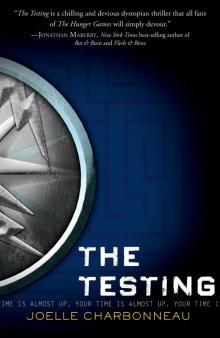 The Testing
The Testing Need
Need Eden Conquered
Eden Conquered Murder for Choir
Murder for Choir Into the Garden
Into the Garden End Me a Tenor
End Me a Tenor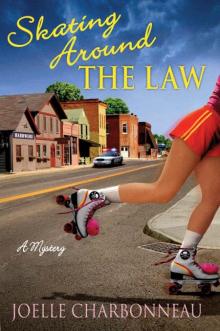 Skating Around the Law
Skating Around the Law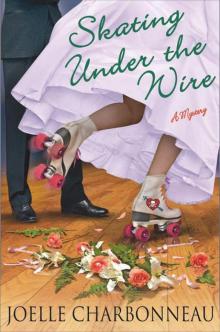 Skating Under the Wire
Skating Under the Wire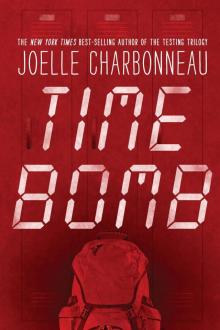 Time Bomb
Time Bomb Skating Over the Line
Skating Over the Line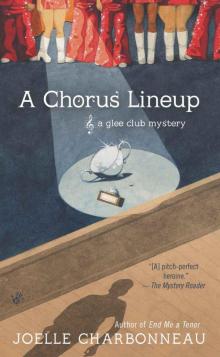 A Chorus Line-Up
A Chorus Line-Up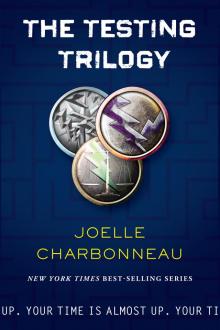 The Testing Trilogy
The Testing Trilogy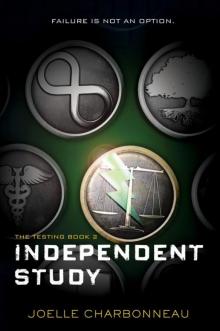 Independent Study
Independent Study Verify
Verify Dividing Eden
Dividing Eden Graduation Day
Graduation Day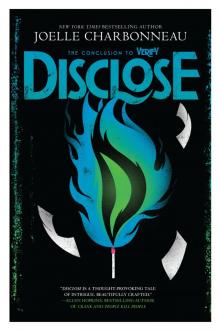 Disclose
Disclose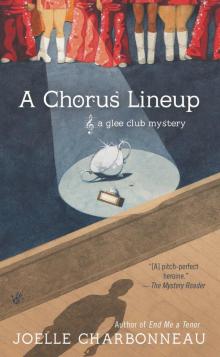 A Chorus Lineup
A Chorus Lineup